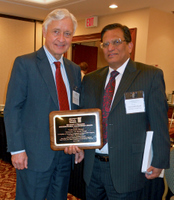Universidad de Magallanes Realiza Charla Sobre Utilización de Energías Renovables May 24, 2012
El día Jueves 24 de Mayo, en el liceo Donald Mc Intyre Griffiths, el Centro Universitario Puerto Williams de la Universidad de Magallanes realizó una charla a los alumnos de 5° y 6° básico denominada "La Energía Solar y Cómo la Utilizamos". La charla fue dictada por el investigador de la Universidad de North Texas Jared Fiorentine, quien se encuentra colaborando con el Centro de Estudios de Recursos Energéticos de la Universidad de Magallanes (CERE) y con el Dr. Humberto Vidal, para potenciar el uso de la energía solar por medio de paneles.
La charla se dio durante la visita que realizó el investigador a Puerto Williams con el fin de evaluar la posibilidad de instalar paneles fotovoltaicos en la Estación de Campo que tiene la Universidad de Magallanes en dicha localidad, como parte de una colaboración entre el Programa de Conservación Biocultural Subantártica (Universidad de North Texas, UMAG e Instituto de Ecología y Biodiversidad) y el CERE.
En la charla se les dio a conocer a los alumnos las distintas formas de utilización de la energía solar y los diferentes tipos de paneles solares que existen, junto a las ventajas de la utilización de este tipo de energía. Además se explicó el proyecto sobre la utilización de esta energía en la Estación de Campo en Puerto Williams.
El taller presentado por el investigador forma parte de los talleres permanentes que se realizan en el liceo, como parte del Fondo de Protección Ambiental "Fortalecimiento del Observatorio Omora de Aves Subantárticas en la Reserva de Biósfera Cabo de Hornos" y del Programa de Difusión de la Ciencia, ambos del Instituto de Ecología y Biodiversidad (IEB), mediante el cual se busca dar a conocer a la comunidad escolar el trabajo y la investigación que científicos del Instituto y de la Universidad de Magallanes están realizando en la zona.
Translated by Google Spanish…
On Thursday May 24, at the Lyceum Donald McIntyre Griffiths, Puerto Williams University Center of the University of Magallanes made a talk to students in grades 5 and 6 called "Solar Energy and How We Use It." The talk was given by the researcher at the University of North Texas, Fiorentine Jared, who is collaborating with the Center for Energy Studies at the University of Magallanes (SERC) and Dr. Humberto Vidal, to promote the use of through solar panels.
The talk was given during his visit to Puerto Williams investigator to evaluate the possibility of installing photovoltaic panels on the Field Station has the University of Magallanes in the locality, as part of a collaboration between Conservation Program Sub-Antarctic biocultural (University of North Texas, Umag and Institute of Ecology and Biodiversity) and the SERC.
In the talk, he conveyed to the students the different ways of using solar energy and the different types of solar panels that exist, together with the advantages of using this type of energy. It also explained the project on the use of energy in the Field Station in Puerto Williams.
The workshop presented by the researcher is part of the permanent workshops taking place in the school, as part of the Environmental Protection Fund "Strengthening the Sub-Antarctic Bird Observatory Omora Biosphere Reserve in Cape Horn" and Dissemination Program science, both from the Institute of Ecology and Biodiversity (IEB), through which it seeks to inform the school community work and research scientists from the Institute and the University of Magallanes being made in the area.



 The Sub-Antarctic team congratulates
The Sub-Antarctic team congratulates